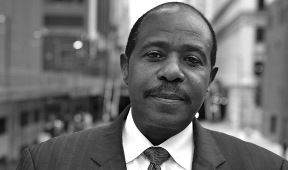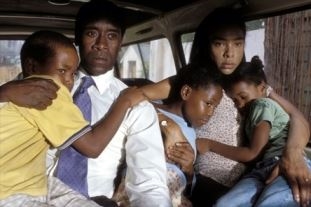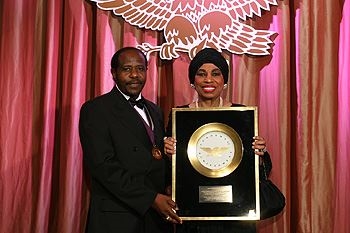 |
| (hrrfoundation.org ()) |
The Rwandan genocide in 1994, left more than 800,000 dead and even more scarred from this horrific event ("United Human Rights Council"). The conflict that started this event had been brewing long before the war had started. It is speculated that the hatred between the Hutus and Tutsis had started between five hundred and one thousand BC ("The Heart of the Hutu-Tutsi Conflict"). In the early 1990's, the two different ethnic groups were in the process of making peace. Unfortunately, they never finished; the plane that the Hutu president was in while he was going to negotiate a peace treaty with the Tutsi rebels was shot down. After that, Hutus and Tutsis started to fight; it was the beginning of the Rwandan genocide. Paul Rusesabagina, an ordinary man born in 1954 as a Hutu, was a person who used the chance to stand up to the authorities to save the people around him. To Paul, it didn't matter what ethnic group a person originated from. After all, his wife, Tatiana, was a Tutsi. At the beginning of the war, Rusesabagina took his wife and four children and hid them in the Hotel des Mille Collines, where he worked as the general manager. 1,268 people fled to his hotel, a hotel meant for only 200 people, to seek refuge and safety. Despite the challenges, Paul decided to help the frightened refugees by providing food and water. Without his help, they would have been left on the streets to die. Afterwards, Rusesabagina was recognized for his noble actions. The film, Hotel Rwanda, was made in honor of him and the lives he saved. He also received the Presidential Medal of Freedom, National Civil Rights Museum Freedom Award, and many more. Paul, later in 2007, wrote a book about his experience called An Ordinary Man and created the Hotel Rwanda Rusesabagina Foundation to help those affected by the genocide. Paul Rusesabagina's selflessness and bravery has helped him save many lives and inspire others around the world.
 |
| The Rusesabagina Family portrayed in the movie (www.ign.com ()) |
Paul Rusesabagina's selflessness during the chaos of all the killing is what helped him save many innocent people in Rwanda. While hiding in the hotel, Rusesabagina was given the option to flee with his family. The UN agreed to bring families to safety. Unfortunately, only a small amount of people were allowed to escape. Instead of leaving with his family, Rusesabagina decided to stay. In his interview with Oprah, Rusesabagina says, "Later that day, I made a decision. I had to tell my wife and children that I would send them to a safe place--but without me...Tatiana and the children were angry that I wasn't going with them. I told them I was the only person who could negotiate for the people in the hotel. If I left, they would be killed, and I would never be a free man. I'd be a prisoner of myself, never able to eat and feel satisfied or go to bed and rest. I'd be a traitor" (O, The Oprah Magazine). Paul Rusesabagina had a choice to leave. He could've fled with his wife and children. He could've been saved by the UN. Instead, Paul made a huge risk staying behind. Despite the chance of being murdered, he stayed in order to help the people that would be lost without him. Even though the evacuation failed in the end, he sacrificed his own safety for the good of the strangers surrounding him. Unlike past tragedies, foreign countries never reached out to help stop the chaos. Instead, they all turned their heads to the suffering of the Rwandans: "history keeps always repeating itself. We saw this happening with the Armenians - the Armenian genocide, the holocausts. And I remember in 1994, I was very angry against each and everybody in the international community because when people were being butchered, they were there. And they never did anything" ("'Hotel Rwanda' Manager: We've Failed To Learn From History"). During this time, many Rwandans begged for the help of others. In response, the other countries ignored the pleas of the dying Hutus and Tutsis. Nobody came to protect them, but Paul Rusesabagina stepped up to take their place. He sheltered 1,268 people and protected them from a harsh death. Without his help, they would have faced deadly consequences. Paul ignored fear, even when it was standing in his doorway. He focused on the protection on the people. Paul Rusesabagina's selflessness is what makes him a hero to over 1,000 lives he saved in the genocide and the others inspired by his story.
Being brave is not something that is easy, it takes courage to face fears. Paul Rusesabagina was able to be brave for the good of others. At one point, Paul was given a gun and was order to shoot his family and neighbors. If he didn't he would be killed. At the Oprah interview, he recalls, "He handed me a gun, and I told him I didn't know how to use it. But I also told him that I understood him. 'You're tired,' I said. 'You're thirsty. You're stressed by the war. I don't blame you for this. But we can find other solutions. Your enemy isn't the old man driving my car or this baby over here'" (O, The Oprah Magazine). Rusesabagina didn't cave in to the Hutus demands. Instead, he stayed calm and collective, something he always is. With his persuasive words, he was able to influence the soldiers to accept money and liquor in exchange for the lives of the people. Rusesabagina knew that at any moment the soldiers could turn and kill his family and neighbors. One wrong word could have killed him and the ones that he loved. Paul was remarkably able to keep his composure during these grueling moments. Rusesabagina was brave and saved many of his loved ones that day. Even after leaving the hotel, Rusesabagina continued his bravery. His life will always be in danger after helping the Tutsis: "When I was living in Rwanda after the genocide, I started seeing people being killed, and I spoke out. Then once you dare and speak out your mind to people who are doing evil, you become a target" ("'Hotel Rwanda' Manager: We've Failed To Learn From History"). Paul Rusesabagina knew that going against the Hutus would be a death sentence. As a Hutu, helping the Tutsis would be a form of betrayal to his "own people". Rusesabagina didn't care about what could happen to him. He decided to take a stand to protect the people around him. He was courageous and valiant, so the others around him could live another day. Paul Rusesabagina has been through a lot of devastating experiences. With all of the lives being taken around him to fearing for his family's life, he was able to survive because of his brave heart that helped him to go on. Rusesabagina protects others because of he can face his fears with courage and bravery.
 |
| (www.achievement.org ()) |
Paul Rusesabagina is a hero because of his selflessness and bravery, that helped save many Rwandans during the genocide. He never turned his back on the people. Even if he had a chance to save himself, Rusesabagina made sure that the others could be saved too. While others didn't have the courage to stand up to the Hutu authorities, Rusesabagina was brave and did what he had to do in order to stop the murders of the Rwandan citizens. Rusesabagina often denies the title of a hero because was only doing what he believed was the right thing to do. His selfless and brave actions got him recognized. In 2004, Hotel Rwanda, a movie recreating the horrors of the genocide, was released. People all around the world were inspired to be as selfless and brave as he was. His actions inspires people today to care for each other and to remember our morals of life. Even after the genocide, Rusesabagina continues to fight for others. He never gives up in his work to help the people affected by the genocide. His book inspires others and spreads the word that we should all be aware about the hidden conflicts throughout the world. The Foundation, that he created, helps those traumatized by the experience. He has inspired others through his actions. Many people have joined the foundation to help him continue his good work. Paul Rusesabagina, an ordinary man who saved the lives of his family, neighbors, and even random strangers, stands as a reminder that heroes come in all shapes and sizes.
Works Cited
"About the Foundation." Hotel Rwanda Rusesabagina Foundation. Hotel Rwanda Rusesabagina Foundation, n.d. Web. 07 May 2015.
"'Hotel Rwanda' Manager: We've Failed To Learn From History." Weekend Edition Saturday 5 Apr. 2014.Biography in Context. Web. 3 May 2015.
O, The Oprah Magazine, Mar2006, Vol. 7 Issue 3, p222, 6p, 2 Color Photographs
"Paul Rusesabagina." Contemporary Black Biography. Vol. 60. Detroit: Gale, 2007. Biography in Context. Web. 1 May 2015.
"Paul Rusesabagina, Humanitarian and Hero, to Speak at Walden University Summer Commencement." PR Newswire 25 June 2013. Biography in Context. Web. 3 May 2015.
"The Heart of the Hutu-Tutsi Conflict." PBS. PBS, n.d. Web. 14 May 2015.
"The Real Hero of Hotel Rwanda." U.S. Catholic. Feb2006, Vol. 71 Issue 2, p18-21. 4p.
"United Human Rights Council." United Human Rights Council. N.p., n.d. Web. 14 May 2015.
Page created on 5/20/2015 12:00:00 AM
Last edited 5/20/2015 12:00:00 AM
